|
|
|
Sort Order |
|
|
|
Items / Page
|
|
|
|
|
|
|
| Srl | Item |
| 1 |
ID:
189909
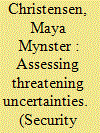

|
|
|
|
|
| Summary/Abstract |
The preemptive turn in counterterrorism has turned future uncertainties into key objects of contemporary security governance. From an empirically grounded perspective, this article contributes with novel insight into the everyday practices of preemptive politics. Focusing on Ghana as a unique case through which to trace how the mobilization of affect accelerates the transnational proliferation of counterterrorism measures and the commodification of future uncertainty, it shows how the global War on Terror has shaped the emergence of counterterrorism in a context characterized by the absence of terrorist attacks on home soil. Exploring how preemption animates outreach activities, simulation exercises, and nighttime patrols, it shows how police officers attempt to make uncertain futures tangible and actionable through practices of imagination and performance. Aimed at assessing terrorist threats that have not (yet) materialized, the article argues that preemptive policing practices cause a conflation of ordinary crime and extraordinary terror that inflates already existing uncertainties and subverts the institutional security logics of preemption.
|
|
|
|
|
|
|
|
|
|
|
|
|
|
|
|
| 2 |
ID:
127803


|
|
|
|
|
| Publication |
2014.
|
| Summary/Abstract |
Contrary to commonsense understandings of torture as a form of information-gathering, confessions elicited through the use of torture produce notoriously unreliable data, and most interrogation experts oppose it as a result. With a focus on the US carceral regime in the War on Terror, this article explores the social relations and structures of feelings that make torture and other seemingly ineffective and absurd carceral practices possible and desirable as technologies of security. While much of international relations scholarship has focused on the ways in which affective and material economies of Orientalism are central to representations of the 'terrorist' threat, this article connects the carceral violences in the racialized lawfare against Muslimified people and spaces to the capture and enslavement of Africans and the concomitant production of the figure of the Black body as the site of enslaveability and openness to gratuitous violence. The article further explores how these carceral security practices are not simply rooted in racial-sexual logics of Blackness, but themselves constitute key sites and technologies of gendered and sexualized race-making in this era of 'post-racial triumph' (HoSang and LaBennett, 2012: 5).
|
|
|
|
|
|
|
|
|
|
|
|
|
|
|
|
| 3 |
ID:
077884
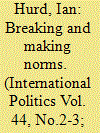

|
|
|
|
|
| Publication |
2007.
|
| Summary/Abstract |
International norms are influential when they are seen as legitimate, and recent American behaviour may undermine the legitimacy of norms on the use of force. I examine three kinds of legitimacy crisis that might arise from American revisionism. First, the US threatens to delegitimate the norms that it challenges, particularly on military preemption. Second, it threatens to undermine its own influence by disassociating American power from one source of legitimation. Finally, it may negate the basic idea of American hegemony as that term is understood in constructivist scholarship and so transform the structure of the international system. Any of these might lead to a crisis, though of different kinds. The American challenge to the customary law on preemption threatens to delegitimize both the existing norms and the social basis of US power, while also attempting to legitimize American interests and new understandings of the norms. It therefore shows the productive and destructive aspects of the power of legitimation in world politics. Legitimation is the link between states and the normative structures of international society
|
|
|
|
|
|
|
|
|
|
|
|
|
|
|
|
| 4 |
ID:
157756
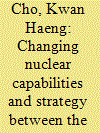

|
|
|
|
|
| Summary/Abstract |
Continuous development of North Korea’s nuclear capabilities and the
accompanying concern about the possible decoupling of the alliance between the
Republic of Korea (ROK) and the United States have produced numerous opinions
on what should be done about North Korea’s nuclear program. While there are
discussions on conceptual possibilities of deterrent or compellent use of nuclear
weapons by North Korea, these discussions often fall short of making specific
connections between the relational nuclear capabilities between North Korea
and the United States, and their nuclear strategies. Such connection is necessary
in grasping a clear picture of the nuclear security environment of the Korean
Peninsula, and formulating possible policy responses the ROK should adopt
as a result. This article seeks to make this connection by analyzing the nuclear
capabilities and strategy of North Korea and the United States. It argues that
North Korea will be able to pressure alliance decoupling only if it is able to field
submarine–based ballistic missiles with an inter-continental range. The ROK should
seek to avoid this outcome by strengthening its own deterrence measures against
North Korea, seeking assurances on the U.S. alliance commitment, and seeking
measures that could reverse North Korea’s potential second–strike capability.
|
|
|
|
|
|
|
|
|
|
|
|
|
|
|
|
| 5 |
ID:
087483


|
|
|
|
|
| Publication |
2009.
|
| Summary/Abstract |
This article explores to what extent the security dilemma through geographically induced first-strike advantages is a contributing cause of ethnic warfare. If there are possibly decisive advantages to be gained from striking the first blow, both temptation and fear may shortcut efforts to resolve a conflict in less costly ways, and trigger massive violence. Theoretical work and case studies suggest that in ethnic conflicts intermingled settlement patterns give rise to such first-strike advantages. I test whether ethnic groups in conflict are more likely to become involved in ethnic warfare if their main region of settlement is ethnically diverse. I also include controls intended to capture other aspects of the security dilemma. In robustness tests, I add indicators of group concentration and local majority status that have been found to increase the risk of ethnic violence in previous quantitative studies. I find a strong, statistically significant association between regional ethnic diversity and ethnic warfare.
|
|
|
|
|
|
|
|
|
|
|
|
|
|
|
|
| 6 |
ID:
114439
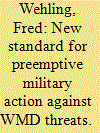

|
|
|
|
|
| Publication |
2012.
|
| Summary/Abstract |
International law clearly requires an imminent threat of attack as a justification for the preemptive use of military force. However, the standard definition of an imminent threat was derived centuries before the development of nuclear, chemical, or biological weapons or ballistic missiles and other delivery systems that can reach their targets in a matter of minutes. Any use of force to alleviate threats posed by weapons of mass destruction (WMD) prior to tactical warning of the actual launch of such weapons falls into the legally and ethically controversial category of "anticipatory self-defense," leaving decision makers potentially liable to prosecution for war crimes. Effective and ethical enforcement of nonproliferation therefore demands a standard for imminence of threat broad enough to allow military action as a last resort but sufficiently restrictive to prohibit indiscriminate action against suspected WMD programs. Following a critical review of selected literature and cases on preemption, the author proposes a new standard for preemptive military action: the existence of operational WMD, or a clandestine program to develop WMD, in contravention of international law. The author discusses the implications of this new proposed standard, which at the time of writing would permit preemptive attack against WMD-armed terrorist groups but prohibit it against all states except Iran and possibly North Korea.
|
|
|
|
|
|
|
|
|
|
|
|
|
|
|
|
| 7 |
ID:
074703
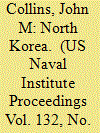

|
|
|
| 8 |
ID:
154702
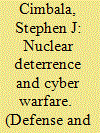

|
|
|
|
|
| Summary/Abstract |
Nuclear deterrence and cyber war seem almost antithetical in their respective intellectual pedigrees. Nuclear weapons are unique in their ability to create mass destruction in a short time. Information or “cyber” weapons, at least for the most part, aim at sowing confusion or mass disruption instead of widespread physical destruction. Nevertheless, there are some intersections between cyber and nuclear matters, and these have the potential to become troublesome for the future of nuclear deterrence. For example, cyber attacks might complicate the management of a nuclear crisis. As well, information attacks on command-control and communications systems might lead to a mistaken nuclear launch based on false warnings, to erroneous interpretations of data or to panic on account of feared information blackout. It is not inconceivable that future nuclear strike planning will include a preliminary wave of cyber strikes or at least a more protracted “preparation of the battlefield” by roaming through enemy networks to plant malware or map vulnerabilities.
|
|
|
|
|
|
|
|
|
|
|
|
|
|
|
|
| 9 |
ID:
080894
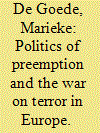

|
|
|
|
|
| Publication |
2008.
|
| Summary/Abstract |
In the midst of the war on terror and unilateral US security politics, many observers look to Europe for alternatives. It is argued that Europe is particularly opposed to preemptive security practice, and prefers instead to rely on the rule of law. This article examines the meaning of preemption in the war on terror, and analyses three aspects of European counter-terror policy. It becomes clear that, with respect to a number of policies that play a key role in preemptive security practice, including criminalizing terrorist support, data retention, and asset freezing, the European Union is world leader rather than reluctant follower. Instead of relying on images that position Europe as inherently critical of preemptive security, debate concerning the legitimacy and desirability of such practices must be actively fostered within European public space
|
|
|
|
|
|
|
|
|
|
|
|
|
|
|
|
| 10 |
ID:
112737
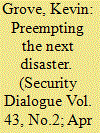

|
|
|
|
|
| Publication |
2012.
|
| Summary/Abstract |
The 2007 launch of the Caribbean Catastrophic Risk Insurance Facility (CCRIF) introduced a new mechanism of state security against the uncertainties of climate change. Proponents argue that increasing the ability of member-states to finance disaster recovery through catastrophe insurance mitigates the effects of increasingly frequent and intense hurricanes and thus contributes to climate change adaptation. In contrast, I offer a critical analysis of the CCRIF that draws out how it facilitates what I call the 'financialization of disaster management'. The introduction of financial logics and techniques enables the state and capital to visualize a population's self-organizing adaptive capacity as both a threat to state-based forms of order and a value that can be leveraged on capital markets as catastrophe risk. Leveraging enhances a state's ability to repair its critical infrastructure and preemptively negate undesirable adaptations. The CCRIF blends risk pooling with parametric insurance techniques to turn the uncertainty surrounding a population's immanent adaptability into catastrophe risks that can be leveraged to enhance state security and capital accumulation in an emergent environment.
|
|
|
|
|
|
|
|
|
|
|
|
|
|
|
|
| 11 |
ID:
071937


|
|
|
|
|
| Publication |
New York, W W Norton, 2006.
|
| Description |
xii, 348p.
|
| Standard Number |
0393060128
|
|
|
|
|
|
|
|
|
|
|
|
Copies: C:1/I:0,R:0,Q:0
Circulation
| Accession# | Call# | Current Location | Status | Policy | Location |
| 051293 | 363.32/DER 051293 | Main | On Shelf | General | |
|
|
|
|
| 12 |
ID:
062585
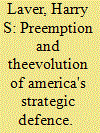

|
|
|
| 13 |
ID:
072243
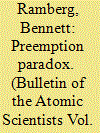

|
|
|
| 14 |
ID:
140523
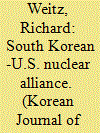

|
|
|
|
|
| Summary/Abstract |
Nuclear-related issues remain at the core of the Seoul-Washington partnership. These include shared nuclear weapons threats to both partners from North Korea, tussles between South Koreans and Americans regarding how to deter and defeat these North Korean threats without antagonizing the other regional nuclear powers, and managing the transformation of the Republic of Korea (ROK) into a major civilian nuclear energy producer and exporter. Whatever the changes in the Northeast Asian security environment, the enduring goals of the South KoreanU.S. defense alliance remain unchanged—to deter North Korean aggression, maintain South Koreans’ security and welfare, contribute to regional and global stability, and work toward Korean reunification. But the shifting nature of the regional security environment has required difficult adjustments by both partners to sustain a robust and effective partnership.
|
|
|
|
|
|
|
|
|
|
|
|
|
|
|
|
| 15 |
ID:
100956


|
|
|
|
|
| Publication |
2010.
|
| Summary/Abstract |
This paper presents a game-theoretic model of suicide terrorism containing three agents: the terrorist leader; a targeted government; and potential terrorist supporters. Supporters join the terrorist group if they gain more from their participation than from their economic opportunities. Preemptive measures by the government can result in a backlash that encourages recruitment through new grievances. Suicide attacks can also lead to recruitment. Increases in preemption costs and/or economic opportunities can reduce the overall level of terrorism, while increasing the proportion of suicide to normal attacks. An increase in the effect of preemption on recruitment, or the propaganda effect of suicide bombings has the opposite effect of increasing normal and suicide attacks, but decreasing the proportion of suicide to normal attacks in the terrorist organization's strategy profile.
|
|
|
|
|
|
|
|
|
|
|
|
|
|
|
|
| 16 |
ID:
112738
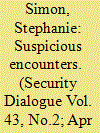

|
|
|
|
|
| Publication |
2012.
|
| Summary/Abstract |
Photographers have become common targets of security practice in the public spaces of US and UK cities. The securitization of photography - where photographers are commonly stopped, questioned, told to surrender film or delete photos, and in some cases arrested - rests upon the invocation of a post-9/11 context and the preemptive security logics that characterize the 'war on terror'. Here, the spatio-temporality of the photograph and the photo-taking subject are in tension with preemptive security stances in which everyday, ordinary actions - such as photography - are rendered suspicious and worthy of potential intervention. Using examples of specific encounters between photographers and security personnel, this article interrogates the conduct of these interventions and the preemptive security stance that scopes ordinary actions and everyday urban spaces through flexible and dispersed acts. Finally, the article considers how this uncoordinated and dispersed practice travels across a wide variety of actors without clear, causal linkages. The practice is a mobile, circuitous one, and through its analysis the article argues for more attention to be paid to everyday, embodied, and dispersed practices of preemption.
|
|
|
|
|
|
|
|
|
|
|
|
|
|
|
|
| 17 |
ID:
165352
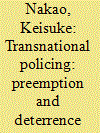

|
|
|
|
|
| Summary/Abstract |
Why does a state directly police certain kinds of transnational perpetrators by itself while indirectly policing other kinds through their host government? To address this question, we develop a formal model, where Defender chooses either to police Perpetrators or to make Proxy do so. According to our theory, the delegation of policing can enhance its effectiveness in light of Proxy’s three advantages: (a) Proxy can convince Perpetrators of punishments more credibly than Defender (communicative advantage); (b) Proxy is more likely to identify Perpetrators and detect what they hold dear (informational advantage); (c) Proxy can cripple and punish Perpetrators more effectively (offensive advantage). On the other hand, the delegation may cause inefficiency if Defender has limited information about Proxy’s choice or cost of policing. Depending on the relative size between these advantages and disadvantages, one of the following four forms of policing may emerge: (i) Defender polices Perpetrators on her own (e.g. Somali counter-piracy operations); (ii) Defender induces Proxy to police Perpetrators (U.S. War on Drugs in Colombia and Mexico); (iii) Defender and Proxy together police Perpetrators (Operation Inherent Resolve); (iv) two or more Defender-Proxy states police Perpetrators in each’s own domain (Interpol, Budapest Convention).
|
|
|
|
|
|
|
|
|
|
|
|
|
|
|
|
|
|
|
|
|